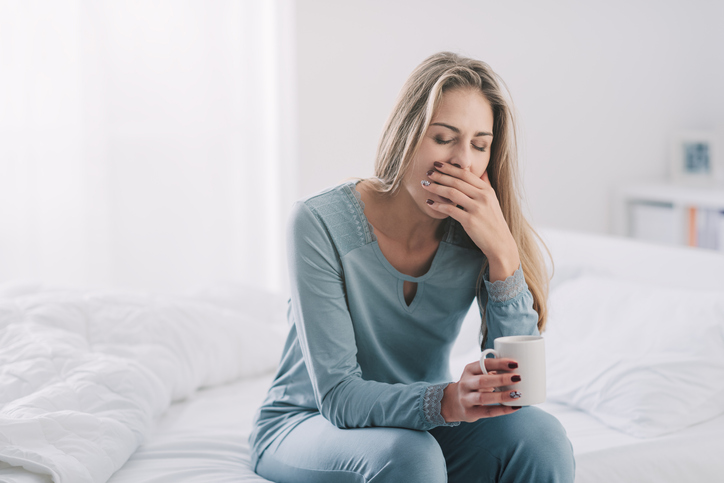If you’re feeling fatigued, not to worry. There are plenty of tweaks you can make to your routine to try and zap tiredness. From upping your water intake to topping up your magnesium levels, these are 10 reasons to tweak your habits in order to get a better night’s slumber.
1. You’re not drinking enough water
It might not be obvious, but not drinking enough water can affect the quality of your sleep. “If you’re dehydrated, you may have a reduction in levels of essential amino acids, which you need to produce melatonin – the sleep-inducing hormone,” explains sleep expert Lucy Shrimpton (sleepnanny.co.uk). However, drink too much, and you’ll fall foul of the night-time toilet run, as Lucy explains: “We have a decreased need to urinate at night to allow us six to eight hours of uninterrupted sleep, but if you drink a lot of water close to bedtime, your sleep may be disturbed because of a need to use the bathroom.” The optimal amount? The NHS (nhs.uk) recommends drinking six to eight glasses of fluid a day. Water, lower-fat milk and sugar-free drinks, including tea and coffee, all count.
2. You’re stressed out
If you’ve ever spent a night tossing and turning, ruminating about conversations you’ve had during daylight hours, you’ll know that stress plays a big impact on your ability to drift off. “Stress comes with a release of the hormone cortisol, which is a little like having adrenaline running through your body,” says Lucy. “This can make it extremely difficult to settle to sleep. This hindrance to sleep can lead to more stress and so the cycle continues.” The solution? Find a method of getting your worries out.
3. You need to get moving
Not moving enough can also affect sleep. “Numerous studies have shown that regular exercise helps people to settle to sleep more easily and experience better quality of sleep through the night,” says Lucy. “Also, a lack of exercise can lead to weight gain which can cause other sleep related issues such as obstructive sleep apnoea.”
4. You’re spending too much time ‘switched on’
Avoiding digital media can go a long way to improving our sleep. “It’s widely known that using a screen within two hours of going to bed can cause sleep disturbance,” says Liz Cooper, nutritional advisor at Bio-Kult (bio-kult.com). “This is because LED screens, found on televisions, computers, iPads and gaming consoles emit blue light, which can affect our circadian rhythm, a process that responds to light and dark and governs such things as our sleep-wake cycle.”
5. You’re not eating enough protein
What we eat can also affect how we sleep, but avoiding sugar and your daily latte may not go far enough. “Getting the balance right with protein is equally important,” says Liz. “Low protein intake is associated with poor quality sleep, while too much protein can contribute to difficulty maintaining sleep. Try to incorporate good quality protein sources such as fish, turkey, eggs, pumpkin and sesame seeds and chicken. These foods also contain tryptophan, which is needed to make melatonin. Other than increasing tryptophan, sufficient protein may support folate and vitamin B12. These compounds have a role in melatonin metabolism and balanced circadian rhythm.”
6. You haven’t got the right micronutrients
Studies have also found an association between poor sleep and micronutrient deficiency. “Insomnia has been linked to low selenium and calcium,” says Liz. “It has been shown zinc to help in regulating sleep; and research has also suggested that low consumption of certain B vitamins can negatively affect slumber. This is because of their role in the production and release of some neurotransmitters and hormones involved in sleep regulation, such as serotonin, a calming neurotransmitter which can also produce melatonin. In addition, B vitamins found in eggs, meat, poultry, fish, legumes and wholegrains, may help in the relief of restless leg syndrome, where a person’s limbs move involuntarily, a condition which is often worse at night, stopping a person getting to sleep or waking them up repeatedly.”






















